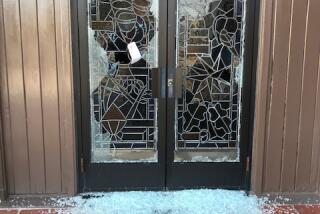Barry Minkow is accused of misusing church money
Barry Minkow’s former congregation accused the con man-turned-preacher of misusing church funds and luring its members into bad investments, allegations that forced a two-week delay in sentencing for the admitted two-time fraud artist.
San Diego’s Community Bible Church said in a letter, part of a confidential pre-sentencing probation report, that Minkow improperly used church funds to finance the fraud-busting business he ran on the side, his defense lawyer said.
The letter also attacks Minkow for leading members of his flock to make ill-fated investments in an unreleased movie about his life, said the lawyer, Alvin Entin.
“It accused Barry of everything except being in bed with a live girl or a dead boy,” Entin said.
Entin represents Minkow in U.S. District Court in Miami, where Minkow entered a guilty plea in March to conspiracy to commit securities fraud. The lawyer said he received a copy of the church’s letter last week from the probation officer who is preparing the sentencing report.
Authorities have not accused Minkow of criminal wrongdoing involving the church.
Entin said confidentiality rules precluded him from releasing the letter, though he could talk about it. “This letter contains material which may negatively impact sentencing,” he said in a court filing seeking a delay in Minkow’s sentencing, which was scheduled for Thursday.
On Tuesday, the judge granted Entin two weeks of extra time to review the allegations and to prepare his response.
Entin said he plans to argue that Minkow had not wronged the church because he always returned funds he used to finance investigations by his Fraud Discovery Institute, a for-profit business Minkow operated on the side. Several church elders invested their own money in the institute, the lawyer said.
“Barry wasn’t stealing anything from the church,” Entin said. “He put in more than he took out. In fact, he worked without pay for the last four years.”
Entin said his client waived a salary of more than $125,000 a year because the church was financially stretched and his institute was making money. Officials at the church, where Minkow had worked for 14 years, did not return calls seeking comment.
Minkow was convicted in the 1980s of operating his ZZZZ Best cleaning firm as a fraud. He emerged from prison as a repentant born-again minister and anti-fraud crusader.
His latest conviction stalled the opening of a laudatory movie about his rise, fall and rehabilitation, leaving filmmakers scrambling to craft a new ending.
Entin acknowledged that investors in the movie haven’t received a return, but said there was no wrongdoing. “It’s not a fraud,” he said. “It was a business deal.”
Minkow pleaded guilty in March to conspiring to drive down the stock price of Lennar Corp. He said the intent was to force the Miami homebuilder to cough up cash and stock in return for a retraction of numerous accusations he had made against the company.
In court papers, Minkow said he recklessly spread falsehoods about Lennar while working for Nicolas Marsch III, a La Jolla developer whose partnership with Lennar had soured. Marsch has denied wrongdoing.
Minkow also admitted making illegal financial bets that Lennar’s stock would decline based on his possession of confidential information — the knowledge that he had triggered an FBI probe of the company, one of the largest homebuilders in the United States.
Allegations of additional bad acts could cause U.S. District Judge Patricia A. Seitz of Miami, who is presiding over the criminal case, to take a skeptical view of Minkow’s pleas for understanding and forgiveness.
Prosecutors have asked Seitz to impose the maximum prison sentence of five years. They could later ask for a reduction in the term if Minkow provides substantial assistance in the prosecution of other people, said Ryan D. O’Quinn, a former prosecutor in the Lennar case who is now in private practice in Miami.
Seitz postponed judgment until July 21, adding a handwritten addendum to the typed decision: “No further extensions.”
In its legal battles with Marsch and Minkow, Lennar had accused Minkow of failing to keep church funds separate from his own.
Those alleged improprieties became an issue May 26 in Sacramento, where Minkow, a frequent FBI informant, testified as a federal witness about his role in exposing an investment scam. Two defendants in that case were convicted.
According to a transcript, Minkow acknowledged under cross-examination that he forged documents in the church’s name to obtain loans, misappropriated parishioners’ money and misdirected funds to his Fraud Discovery Institute.
Even though his client had commingled his funds with those of the church to finance his investigations, Entin said, there was never an intent to benefit at the expense of his congregation.
As part of his sentencing report, Minkow submitted letters describing his work at exposing scams and conducting fraud-detection seminars for FBI agents and private accountants.
Peter F. Del Greco, a Securities and Exchange Commission staff attorney in Los Angeles, said in a letter to Seitz that Minkow had helped the local office break up five investment scams.
Lauded as a teenage business genius, Minkow wound up on Oprah Winfrey’s talk show in the 1980s after starting ZZZZ Best, a seemingly booming carpet and furniture cleaning business based in his parents’ garage in Reseda.
After 86% of ZZZZ Best’s work turned out to exist only in forged documents, Minkow was convicted at trial for defrauding investors, and he spent more than seven years in prison.
More to Read
Inside the business of entertainment
The Wide Shot brings you news, analysis and insights on everything from streaming wars to production — and what it all means for the future.
You may occasionally receive promotional content from the Los Angeles Times.











